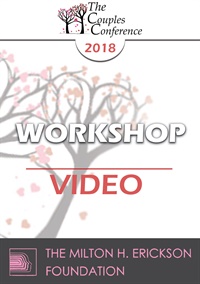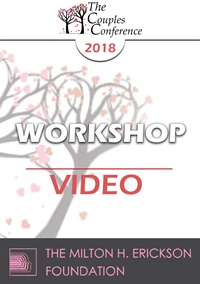Credit available - Click Here for more information
- Average Rating:
- Not yet rated
- Topic Areas:
- Attachment | Neuroscience | Keynotes | Continuing Education | Differentiation | Couples Therapy | Neurobiology
- Categories:
- Couples Conference | Couples Conference 2018 | Online Continuing Education | Pioneers in Couples and Family Therapy
- Faculty:
- Stan Tatkin, PsyD, MFT
- Course Levels:
- Master Degree or Higher in Health-Related Field
- Duration:
- 50:59
- Format:
- Audio and Video
- Original Program Date:
- May 06, 2018
- Short Description:
- This presentation integrates foundational theories of attachment, differentiation, and individuation with current neuroscience to inform a psychobiological approach to couple therapy. Tatkin examines how early developmental models apply to partners with varying social-emotional complexity, highlighting deficits like alexithymia and theory of mind. Clinicians are encouraged to adapt interventions based on cognitive capacity and emphasize face-to-face, collaborative engagement in session.
- Price:
-
Sale is $29.00
price reduced from Base Price - $59.00

- Average Rating:
- Not yet rated
- Topic Areas:
- Couples Therapy | Workshops | Developmental Therapy Model | Experiential Therapy | Cognitive Psychology | Infidelity | Gender Dynamics
- Categories:
- Couples Conference | Couples Conference 2018 | Pioneers in Couples and Family Therapy
- Faculty:
- Ellyn Bader, PhD | Sue Diamond, MA, RCC
- Duration:
- 1:59:27
- Format:
- Audio Only
- Original Program Date:
- May 06, 2018
- Short Description:
- This workshop is designed for couple’s therapists who have trained in the Developmental Model of Couples Therapy. Increase your skills in effective confrontation and incisive resolution of intrapsychic conflicts. Bring some of your toughest challenges and join Ellyn Bader and Sue Diamond-Potts to strengthen your ability to confront and transform those unrelenting couples’ impasses.
- Price:
- $15.00 - Base Price

- Average Rating:
- Not yet rated
- Topic Areas:
- Workshops | Narcissism | Personality Disorders | Borderline | Couples Therapy | Developmental Psychology
- Categories:
- Couples Conference | Couples Conference 2018 | Pioneers in Couples and Family Therapy
- Faculty:
- Stan Tatkin, PsyD, MFT
- Duration:
- 2:03:49
- Format:
- Audio Only
- Original Program Date:
- May 06, 2018
- Short Description:
- This workshop reframes couple therapy for personality-disordered partners through a psychobiological, polytheoretical lens. Focusing on borderline, narcissistic, and schizoid presentations, it equips clinicians to differentiate these from insecure or neurotic traits and intervene without over-individualizing. Practical tools help therapists manage complex defenses, sustain neutrality, and maintain a strong therapeutic frame in high-stakes relational systems.
- Price:
- $15.00 - Base Price
Tags: Borderline Narcissistic Personality Disorder Couples Therapy Personality Disorders Experiential Learning Narcissism Reframing Strategic Therapy Tailoring Therapeutic Alliance Utilization Borderline Personality Affect Regulation Object Relations Psychotherapeutic Framework Transference Personality Spectrum
Credit available - Click Here for more information
- Average Rating:
- Not yet rated
- Topic Areas:
- Keynotes | Continuing Education | Couples Therapy | Marriage | Attachment | Communication | Community | IMAGO
- Categories:
- Couples Conference | Couples Conference 2018 | Online Continuing Education | Pioneers in Couples and Family Therapy
- Faculty:
- Harville Hendrix, PhD | Helen LaKelly Hunt, PhD
- Course Levels:
- Master Degree or Higher in Health-Related Field
- Duration:
- 54:42
- Format:
- Audio and Video
- Original Program Date:
- May 05, 2018
- Short Description:
- This keynote highlights the vision behind Safe Conversations and the Dallas Project, a large-scale initiative to improve relational health citywide. Hendrix and Hunt share how teaching dialogue, empathy, and zero-negativity practices can reduce divorce, poverty, and social fragmentation. They emphasize connection as a cultural foundation and present couples as catalysts for societal healing, promoting a shift from individual to relational models of mental health.
- Price:
-
Sale is $29.00
price reduced from Base Price - $59.00
Credit available - Click Here for more information
- Average Rating:
- Not yet rated
- Topic Areas:
- Keynotes | Continuing Education | Couples Therapy | Gender | Masculinity
- Categories:
- Couples Conference | Couples Conference 2018 | Online Continuing Education | Pioneers in Couples and Family Therapy
- Faculty:
- Terry Real, LICSW
- Course Levels:
- Master Degree or Higher in Health-Related Field
- Duration:
- 33:57
- Format:
- Audio and Video
- Original Program Date:
- May 05, 2018
- Short Description:
- A leading expert on male psychology shares insights on the evolving nature of masculinity, examining both progress and backlash in the cultural landscape. He encourages therapists to help men reconnect with vulnerability and emotions, using truth-based techniques to build healthy self-esteem and relational strength. The talk underscores the vital role of women therapists and the importance of clinical skill over gender in fostering meaningful therapeutic change.
- Price:
- $0.00 - $29.00

- Average Rating:
- Not yet rated
- Topic Areas:
- Emotionally Focused Therapy (EFT) | Workshops | Attachment | Couples Therapy | Relationships
- Categories:
- Couples Conference | Couples Conference 2018
- Faculty:
- Sam Jinich, PhD
- Duration:
- 1:16:10
- Format:
- Audio Only
- Original Program Date:
- May 05, 2018
- Short Description:
- Secure attachment offers us a potent sense of safety and a way to maintain equilibrium in the presence of danger or threat. These bonds allow us to tolerate and cope with our human frailty. The love one person feels from another has an enormous effect on them, both physically and emotionally. One of the goals of EFT is to help partners see how they are both caught in a recurring pattern of emotional disconnection, triggering each other into aggressively demanding a response or freezing up and sh
- Price:
- $15.00 - Base Price

- Average Rating:
- Not yet rated
- Topic Areas:
- Workshops | Couples Therapy | Relationships | Communication | Trauma
- Categories:
- Couples Conference | Couples Conference 2018 | Pioneers in Couples and Family Therapy
- Faculty:
- Harville Hendrix, PhD | Helen LaKelly Hunt, PhD
- Duration:
- 1:27:55
- Format:
- Audio Only
- Original Program Date:
- May 05, 2018
- Short Description:
- This workshop highlights the shift from individualism to a relational model in couples work, emphasizing the importance of curiosity, wonder, and connection. Key concepts discussed include the “space between” partners, the Zero Negativity Pledge, and the Steps to Wonder process. The framework presented aims to reduce conflict, enhance empathy, and help couples experience greater relational vitality.
- Price:
- $15.00 - Base Price

- Average Rating:
- Not yet rated
- Topic Areas:
- Workshops | Multicultural | Couples Therapy | Relationships | Polyamory
- Categories:
- Couples Conference | Couples Conference 2018
- Faculty:
- Martha Kauppi, MS MFT
- Duration:
- 1:51:58
- Format:
- Audio Only
- Original Program Date:
- May 05, 2018
- Short Description:
- Are you ready to hear your favorite long-term couple client tell you they are fighting because one of them is interested in exploring polyamory and the other is not? Would you choose to work with a couple who told you on the phone they live and love with 2 other people and some tensions are arising? Many people are exploring consensually non-monogamous relationships, and as a result, related issues are showing up in therapy rooms everywhere. This workshop will debunk myths, distinguish between n
- Price:
- $15.00 - Base Price

- Average Rating:
- Not yet rated
- Topic Areas:
- Emotionally Focused Therapy (EFT) | Workshops | Attunement | Couples Therapy | Avoidant
- Categories:
- Couples Conference | Couples Conference 2018
- Faculty:
- Sam Jinich, PhD
- Duration:
- 1:07:55
- Format:
- Audio Only
- Original Program Date:
- May 05, 2018
- Short Description:
- When One or Both Partners are Highly Cognitive or Emotionally Avoidant. Accessing and deepening vulnerable emotions that are at first hidden, unspoken, unknown or masked by reactive and protective emotions is one of the most powerful skills of an emotionally focused couples therapist. Emotionally focused therapists facilitate emotionally moving enactments by guiding avoidant partners to turn to their partner and to share with them about their pain, sadness and fears.
- Price:
- $15.00 - Base Price
Credit available - Click Here for more information
- Average Rating:
- Not yet rated
- Topic Areas:
- Workshops | Continuing Education | Marriage | Passive-Aggressiveness | Couples Therapy
- Bundle(s):
- Learning Track - Couples Starter Kit
- Categories:
- Couples Conference | Couples Conference 2018 | Online Continuing Education
- Faculty:
- Peter Pearson, PhD
- Course Levels:
- Master Degree or Higher in Health-Related Field
- Duration:
- 2:01:25
- Format:
- Audio and Video
- Original Program Date:
- May 05, 2018
- Short Description:
- Passive aggressive spouses challenge even seasoned couple’s therapists. One partner over functions and the other under functions. Both become entrenched in this pattern. And the passive aggressive partner stubbornly resists your best insights and agreements for change. As conventional therapy often falls flat with this couple, I will do a demonstration showing you to stay out of the middle and create an unconventional leverage for change. Leave with a comprehensive framework for changing
- Price:
-
Sale is $29.00
price reduced from Base Price - $59.00
Credit available - Click Here for more information
- Average Rating:
- Not yet rated
- Topic Areas:
- Addiction | Couples Therapy | Workshops | Continuing Education | Love | Neurobiology | Neuroscience
- Categories:
- Couples Conference | Couples Conference 2018 | Online Continuing Education
- Faculty:
- Helen E. Fisher, PhD
- Course Levels:
- Master Degree or Higher in Health-Related Field
- Duration:
- 1:57:48
- Format:
- Audio and Video
- Original Program Date:
- May 04, 2018
- Short Description:
- Biological Anthropologist Helen Fisher discusses four broad basic styles of thinking and behaving associated with four primary brain systems: the dopamine, serotonin, and testosterone and estrogen/oxytocin systems. She discusses why people are predisposed to love one person rather than another (mate choice). She hypothesizes that individuals who primarily express of the constellation of traits linked with each of these brain systems may be predisposed to different forms of love addiction, includ
- Price:
-
Sale is $29.00
price reduced from Base Price - $59.00

- Average Rating:
- Not yet rated
- Topic Areas:
- Couples Therapy | Workshops | Communication | Relationships | Relational Life Therapy Model (RLT) | Trauma
- Categories:
- Couples Conference | Couples Conference 2018 | Pioneers in Couples and Family Therapy
- Faculty:
- Terry Real, LICSW
- Duration:
- 58:30
- Format:
- Audio Only
- Original Program Date:
- May 04, 2018
- Short Description:
- This workshop is on Relational Life Therapy (RLT), a model designed to help clients move beyond shame and grandiosity to build healthier relationships. The speaker shares techniques for confronting dysfunctional behaviors, exploring family-of-origin patterns, and teaching practical relational skills. A case study illustrates how leverage, accountability, and skill-building can shift even high-conflict couples toward repair and responsibility.
- Price:
- $15.00 - Base Price

- Average Rating:
- Not yet rated
- Topic Areas:
- Sex and Sexuality | Attachment | Workshops | Couples Therapy | Interviewing | Neurobiology
- Categories:
- Couples Conference | Couples Conference 2018 | Pioneers in Couples and Family Therapy
- Faculty:
- Stan Tatkin, PsyD, MFT
- Duration:
- 1:59:07
- Format:
- Audio Only
- Original Program Date:
- May 04, 2018
- Short Description:
- This workshop explores sex as a core issue in couple therapy, emphasizing psychobiological and attachment-based frameworks. Tatkin presents bottom-up interviewing and assessment techniques that address implicit somatic responses, performance anxiety, and intimacy challenges. Clinicians learn to integrate neurobiology, arousal regulation, and attachment style into practical interventions for treating sexual dissatisfaction and dysfunction.
- Price:
- $15.00 - Base Price

- Average Rating:
- Not yet rated
- Topic Areas:
- Workshops | Anxiety | Couples Therapy | IMAGO | Conflict | Gender
- Categories:
- Couples Conference | Couples Conference 2018 | Pioneers in Couples and Family Therapy
- Faculty:
- Harville Hendrix, PhD | Helen LaKelly Hunt, PhD
- Duration:
- 1:47:37
- Format:
- Audio Only
- Original Program Date:
- May 04, 2018
- Short Description:
- This workshop focuses on building safety and connection in relationships using Imago therapy. Participants practice mirroring, validation, and sharing childhood experiences to better understand unmet needs. Key concepts include emotional symbiosis, the “space between” partners, and the dynamic between “hailstorm” and “turtle” personalities. Emphasis is placed on empathy, mutual healing, and the impact of early experiences on adult relationships.
- Price:
- $15.00 - Base Price
Credit available - Click Here for more information
- Average Rating:
- Not yet rated
- Topic Areas:
- Couples Therapy | Keynotes | Continuing Education | Therapist Development | Goals of the Therapist | Clinical Psychology | Neuroscience | Relationships
- Categories:
- Couples Conference | Couples Conference 2018 | Online Continuing Education | Pioneers in Couples and Family Therapy
- Faculty:
- Ellyn Bader, PhD | Sue Diamond, MA, RCC
- Course Levels:
- Master Degree or Higher in Health-Related Field
- Duration:
- 1:00:59
- Format:
- Audio and Video
- Original Program Date:
- May 04, 2018
- Short Description:
- Sue Diamond Potts interviews Dr. Ellyn Bader about her 33 years specializing in couples therapy. They discuss what it was like when she started and how the field has changed. They especially focus on what Ellyn has learned from consulting to couples therapists from 33 countries. Ellyn also describes common mistakes therapists make and what it takes to help couples and couples therapists evolve.
- Price:
- $0.00 - $29.00
Tags: Includes CE - CC18 Includes CE Online CE Couples Therapy Therapist Development Goals of the Therapist Attachment Conflict Resolution Developmental Model Differentiation Emotional Regulation Limbic System Influence Neuroscience Professional Growth Relationship Dynamics Self-Soothing Emotional Overwhelm
Credit available - Click Here for more information
- Average Rating:
- Not yet rated
- Topic Areas:
- Addiction | Keynotes | Continuing Education | Love | Couples Therapy | Neuroscience | Sex and Sexuality
- Categories:
- Couples Conference | Couples Conference 2018 | Online Continuing Education
- Faculty:
- Helen E. Fisher, PhD
- Course Levels:
- Master Degree or Higher in Health-Related Field
- Duration:
- 57:05
- Format:
- Audio and Video
- Original Program Date:
- May 04, 2018
- Short Description:
- Biological anthropologist Helen Fisher discusses three brain systems that evolved for mating and reproduction: the sex drive; feelings of intense romantic love; and feelings of deep attachment to a long term partner. She then focuses on her brain scanning research (using fMRI) on romantic rejection and the trajectory of love addiction following rejection. She concludes with discussion of the brain circuits associated with long-term partnership happiness and the future of relationships in the dig
- Price:
-
Sale is $29.00
price reduced from Base Price - $59.00
Credit available - Click Here for more information
- Average Rating:
- Not yet rated
- Topic Areas:
- Law & Ethics | Continuing Education | Couples Therapy | Therapist Development
- Categories:
- Couples Conference | Couples Conference 2018 | Online Continuing Education
- Faculty:
- A. Steven Frankel, PhD, JD, ABPP
- Course Levels:
- Master Degree or Higher in Health-Related Field
- Duration:
- 3:33:07
- Format:
- Audio and Video
- Original Program Date:
- May 03, 2018
- Short Description:
- This six-hour program seeks to provide information and recommendations for mental health professionals whose work includes the assessment and treatment of couples and families. The program begins with an update on legal and ethical developments that affect providers, and then moves to a discussion of risk management strategies for clinicians, including the most critical issues faced by clinicians in their work. We continue with important issues concerning confidentiality and “secrets"
- Price:
- $0.00 - $29.00
Credit available - Click Here for more information
- Average Rating:
- Not yet rated
- Topic Areas:
- Continuing Education | Law & Ethics | Couples Therapy | Therapist Development
- Categories:
- Couples Conference | Couples Conference 2018 | Online Continuing Education
- Faculty:
- A. Steven Frankel, PhD, JD, ABPP
- Course Levels:
- Master Degree or Higher in Health-Related Field
- Duration:
- 1:09:54
- Format:
- Audio and Video
- Original Program Date:
- May 03, 2018
- Short Description:
- This six-hour program seeks to provide information and recommendations for mental health professionals whose work includes the assessment and treatment of couples and families. The program begins with an update on legal and ethical developments that affect providers, and then moves to a discussion of risk management strategies for clinicians, including the most critical issues faced by clinicians in their work. We continue with important issues concerning confidentiality and “secrets"
- Price:
-
Sale is $29.00
price reduced from Base Price - $59.00










